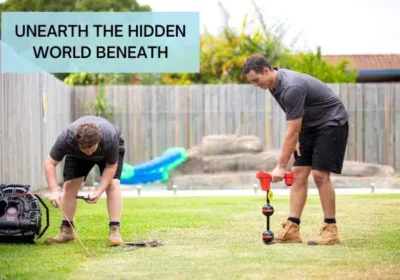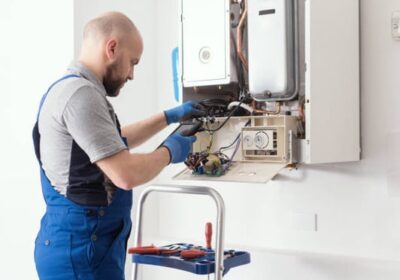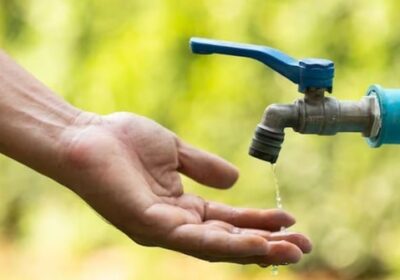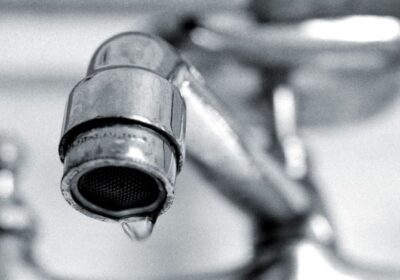Your Guide To Plumbing In Your House
Do-it-yourselfers know that the satisfaction of completing a project by themselves is a great feeling. That’s why more people are taking on plumbing projects themselves without hiring a plumber. Not only is it less expensive, but it’s also faster! Fortunately, there are now plenty of guides that will help you tackle plumbing jobs on your own and to ensure you don’t run foul of the council or your insurer.
Installing your own plumbing?
There are a lot of steps you have to take when installing plumbing in your house. First, you should acquire permits for the work. These permits will make sure that the plumbing design is up to code. They will also help you prevent a future pipe malfunction.
Plumbing installation should be done by a registered plumber. Plumbing installation is an important part of building a new house, so you should make sure you have the right plumbing contractor when you hire someone to do it.
When installing plumbing in your house, you should consider the materials and ensure your plumber is on board with this too. You don’t want to use cheap, inferior plumbing materials. Instead, use durable plumbing fixtures made of modern materials. A poorly installed plumbing system can lead to water damage and mold growth. In addition, improperly installed plumbing can make your plumbing system less efficient and may cause leaks.
The first step your plumber will do in the installation process involves setting up a sewer connection. This enables your house’s sewer line to connect to the sewerage system. This is done before the concrete foundation is poured. In the rough-in plumbing phase, basic lines are laid without final connections.
Maintaining your plumbing
Plumbing is an important part of your house and needs to be regularly maintained. It keeps clean water flowing into your home and disposes of waste. If it fails to work properly, it can lead to a large mess and high bill! Regular maintenance will ensure that problems don’t arise and will save you money on water and energy bills.
There are a number of simple steps you can take to maintain your plumbing. The most important thing is to avoid clogging your drains. Clogged drains cause problems, and they can shorten the lifespan of waste pipes. To prevent clogs, remove objects before they become fully blocked.
Understanding your plumbing
The plumbing system in your house is made up of a number of components. Generally, it can be divided into three main systems: water supply, drainage, and water heating. Large pipes carry water from the city to the house, and individual lines branch off from them. For example, your kitchen sink may be connected to the main water supply line, while your toilet may be connected to the main drain line.
Plumbing in a house is divided into two subsystems – one that brings in clean water, while the other removes wastewater. These two systems should never come into contact, to prevent contaminated water. When water comes into your house, it passes through a meter to track water use. The main shut-off valve is typically located near the meter, and you must close it to turn off water.
Plumbing Codes
Plumbing codes are the rules and regulations that govern how plumbing systems are designed and installed in a home. They are designed by committees of experts to ensure that buildings are safe and sanitary. Failure to follow these codes can be costly, and improper installations can pose a safety risk. Plumbing problems also affect the value of a home.
New South Wales plumbing codes
Western Australia plumbing codes
South Australia plumbing codes
Northern Territory plumbing codes
Building codes are enforced to prevent major disasters from happening. They also help promote harmony among home owners.
Top Plumbing Questions to Ask a Plumber
Why should I ask a plumber questions? Here are a few reasons why you should ask a plumber. These questions are designed to help you determine whether the person you’re hiring is accountable and if they have the proper communication and problem-solving skills to complete the job.
Why you should ask a plumber questions
Asking a plumber questions is important, especially if you’re looking to hire a professional for a major job. You’ll want to know what training and experience they have, and you don’t want to hire someone who hasn’t done plumbing work before. Some plumbers charge by the hour, and you’ll want to be sure to find out how long they’ve been working. You can also ask for references. A reputable plumber should be willing to provide these.
Another important question to ask a plumber is how long they’ve been in business. If they’ve been in business for many years, they’ve probably fixed more problems and are therefore more likely to provide quality service. Asking them how long they’ve been in the business will also help you determine whether or not they have the experience necessary to do the job correctly. By asking these questions, you can be sure you’re hiring the best plumber for the job.
Use a licenced plumber
When selecting a plumber, ask them about their experience and licensing. Those with more experience can be more reliable and faster at their jobs. This will help set the tone for the plumbing project and ensure a positive experience.
Plumber licencing in Queensland
Plumber licencing in Northern Territory
Plumber licencing in Western Australia
Asking a plumber a few questions can also help you avoid a major plumbing issue. Plumbing leaks can cause massive damage to your home, and it’s important to find out how quickly he can fix a large leak. You should also ask how much he charges for his services. Having a good idea of what a plumber charges will prevent you from spending too much money, and will help you choose a plumber that will fit your budget.
Before hiring a plumber, ask about his license, rate, and experience. You can also ask about his membership in professional organizations. This will help you ensure that you get the best service for the best price. The plumber you choose should also be insured.
Get a plumbing quote or estimate
The company should be able to give you an estimate in writing. It’s best to know in advance what the price will be and whether or not the plumber charges extra if you’re not happy. You should also know how long the plumber will need to finish the job, and whether he’ll charge by the hour or by the job. You should also ask about any extra parts that the plumber may need.
Common plumbing problems
Plumbing is a very important part of any home. However, as the house ages, the plumbing in the house may start to show signs of wear and tear. While some plumbing issues are easy to fix on your own, some are dangerous and require professional help. If you’re looking for some simple tips on how to fix your common plumbing problems, you’ve come to the right place.
One of the most common plumbing problems is clogged drains. This can be caused by a number of things. First of all, you should avoid putting things down your drain, especially the sink. These items are not only unsanitary, but can also clog your drain. The only way to prevent blocked drains is to have them cleaned regularly.
Leaky pipes can also lead to water damage. Even if they’re not visible, leaking pipes can wreak havoc on your floors and furniture. Getting a professional plumber to repair or replace damaged pipes will prevent future damage. It’s also important to keep your thermostat at a steady temperature throughout the day to avoid freezing pipes.
Another common plumbing problem is a running toilet. Toilets that are constantly running waste hundreds of gallons of water every day. Clogged toilets can also be caused by foreign objects in them. A professional plumber will be able to find and fix the problem fast. If you want your toilet to stop running, consider fixing or replacing these parts.
Safety-related responsibilities of a plumber
Plumbers are responsible for maintaining a safe working environment. Since plumbing repairs and maintenance are often dangerous, plumbers need to take the necessary precautions to avoid injury. Here are some general safety practices that plumbers should follow. These include wearing protective clothing and ensuring that work areas are kept clean and dry. Plumbers must also protect themselves from falling on hot parts of equipment and steam lines. They also need to wear heat-insulating gloves and always drain pipes before working.
Plumbing technicians are responsible for the installation and repair of all plumbing systems, including sewer and gas systems. They must follow safety regulations and be familiar with blue prints, and they must understand how to use a leak detection system. They should also be able to diagnose any issues that may arise and make recommendations to their customers.
Plumbing Problems You Should Never Solve By Yourself
Plumbing is one of the most important parts of a building. People depend on it to get water, but it can also break down at any time. Even the smallest problems can turn into a major disaster if not repaired immediately. Therefore, it’s best to leave any plumbing issues to the professionals.
While some plumbing issues can be easily solved, others require special tools and skills. For example, a defective water heater may require a plumber’s expertise. Even though it might be tempting to tackle the problem yourself, the lack of experience and skills can cause even more issues. It’s important to know when to call a plumber and when to get out your toolbox.
Taking on plumbing repairs on your own can be a tempting option, especially if you’re on a tight budget. However, DIY plumbing projects can cause serious damage to your plumbing system and lead to more costly repairs in the future. Even if you’re handy with plumbing tools, you shouldn’t try to do complicated repairs without the help of a qualified plumber.
A Guide To Hot Water Systems
There are many different types of hot water systems on the market today. Some are simple and easy to use, while others are more advanced. With so many options, it can be difficult to decide which is best for your home. A hot water system guide can help you make a more informed decision about which model is right for you. Whether you’re buying a brand-new system or retrofitting an existing one, this guide will help you find the best option for your needs.
One of the most common forms of hot water systems is the electric model. These units use your house’s electric supply and can be installed relatively easily. However, they are more expensive to install and maintain. In addition, they also begin to use up more energy as they age. Therefore, experts recommend installing them in a garage, basement, or outside the house in a shed.
Most hot water systems are designed to provide heat to several locations. For example, several greenhouses or curing barns may be heated by the same system. The water from the boiler flows through large main distribution lines to each location. These lines are linked together by check valves.
It is crucial to maintain your hot water system to ensure its longevity. Without regular maintenance, you could run the risk of expensive repairs or even worse, a leak that can lead to a serious health problem. Hiring a professional plumber for regular maintenance can help you avoid these problems by extending the life of your hot water system. You can also choose a solar powered hot water system to save even more money. But make sure to consult with a plumber to find the best option for your home.
Before installing your new hot water system, remember to check the installation bylaws in your area. Some councils have strict rules about what type of hot water systems you can install. If you don’t know what your local laws are, it’s best to contact a professional to ensure your hot water system is installed safely.
When purchasing a hot water system, it is crucial to consider the size of the system you’ll need. A small household will do just fine with a 90-litre system, but a large household may need a 270-litre tank or more. You’ll also need to consider the number of hot water outlets you have.
Electric or gas powered systems are the most efficient, but they also consume the most energy.
The Benefits Of A Low Flow Shower Head
Installing a low-flow shower head can save you thousands of gallons of water per year. It can also save on your heating bills. Old shower heads may use up to 2.5 gallons of water per minute and can increase your utility bills. Whether you have a single bathroom or several, a low-flow shower head can make all the difference.
Installing a low-flow shower head can help you reduce your water usage by as much as 40% (source). This will significantly lower your monthly or annual water bill. Furthermore, you can save on energy bills, which are the second largest expense for the average household. It is also a good way to reduce your carbon footprint.
Despite the low-flow benefits, there are some homeowners who can’t adjust to a low-flow shower head. Some are used to high-pressure systems and find it difficult to switch. However, low-flow shower heads are a great way to save money and protect the planet.
Installing a low-flow shower head is a simple and quick process that will make your water bill significantly lower. A low-flow shower head will also provide a full and gentle shower spray.
CCTV Drain Inspections
CCTV drain inspections can be very useful for determining the health of drainage systems. It can also help with locating blocked drains. These inspections are usually conducted by drainage specialists. They use the latest technology to identify any problems with drainage systems. They can be used to help property owners avoid costly repairs in the future.
A CCTV drain inspection is a non-invasive way to detect drainage problems. It allows the plumbing professional to see the exact problem and find a solution with his or her own eyes. This prevents multiple plumbing visits for ineffective solutions. Another advantage of CCTV drain inspections is that they save homeowners a lot of money.
A CCTV drain inspection is an essential part of routine maintenance for any property owner. These inspections can uncover problems before they escalate and cause major damage. CCTV drain inspections involve sending a small camera into the drain to capture high-definition video. The camera can detect blockages, tree roots, and cracks. The pictures can be stored for future reference.
CCTV drain inspections are particularly important for areas with heavy rainfall or flooding. They are an excellent way to ensure your drains function properly for years to come. A clogged or broken drain can be a huge headache for a property owner. Grease, hair, and other debris can build up in drain pipes and cause water damage and expensive repairs.
The Dangers of Gas in Your House
If you’re living in a house that has gas pipes running through it, you’re at risk for carbon monoxide poisoning. While it may be odorless, carbon monoxide is extremely toxic to your body and can even lead to death. Even a small leak can be dangerous. Over time, these leaks can build up and pollute the air. This reduces the amount of oxygen in the air, which can cause difficulty breathing. To protect yourself and your family, consider hiring a plumber to inspect your pipes and appliances for leaks.
If you notice a leak, you should call your utility company immediately. Never attempt to fix or repair a gas leak on your own. You should also be careful when using electronics in your home, as electricity can ignite leaked natural gas. If you do find a leak, leave the building as quickly as possible. If the leak is large and slow, it can be difficult to detect. A natural gas detector can help detect a gas leak and alert you to its presence.
Natural gas detectors are highly recommended for homes that use natural gas. They alert the homeowner to dangerous levels of the gas in the air. Installing a carbon monoxide detector is also a good idea for gas users. Carbon monoxide poisoning can be fatal, and it can also cause headaches.
If you notice a mild gas odor, you can turn off your pilot lights or call the gas company. If the odor is strong, you should leave the area immediately. Gas is extremely volatile, and a leak in your house increases the risk of an explosion. It’s crucial that you report any gas leaks in your house immediately, and call the gas company.








![Refined Plumbing Sunshine Coast Announces Comprehensive Selection of Services [PRESS RELEASE]](https://yourhomeandgardenhub.com.au/wp-content/uploads/2023/08/refined-plumbing-logo-440x150-1-400x150.png)

